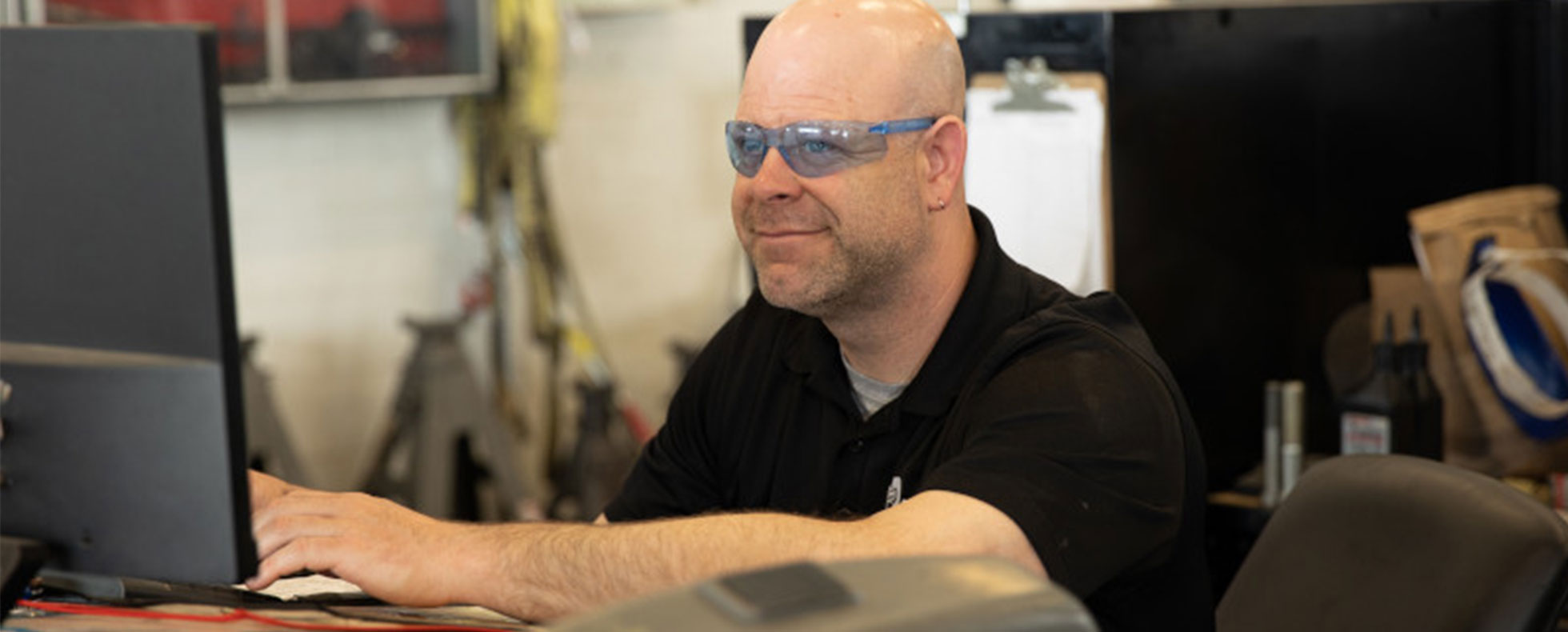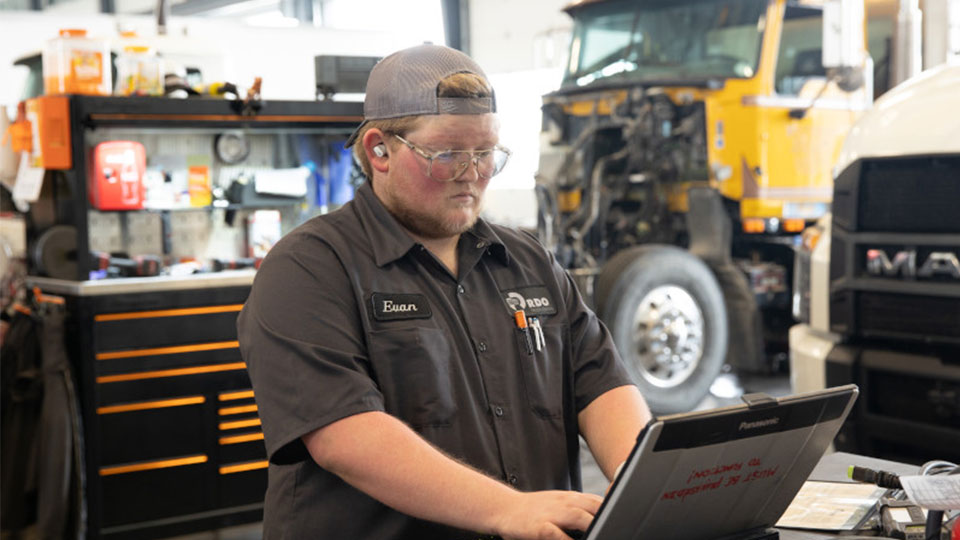
No job is without challenges. Whether you work in an office, in a restaurant, on a construction site or at the International Space Station, every position has problems to solve and issues to overcome.
Being a diesel mechanic, or service technician (as we call them), is no different.
What challenges can you expect to encounter in this type of role? And, perhaps most importantly, what can you do to overcome them when they arise?
These are important questions to answer before you start any new job.
RDO Equipment Co. employs over 1,000 service technicians in more than 80 locations across the U.S. These service professionals are vital to the success of our organization, as they are for companies in many industries.
You should be aware of several challenges associated with being a diesel mechanic before jumping into an open position near you — particularly if you’re brand new to the field.
In this article, you’ll learn what challenges you can expect to encounter as a diesel mechanic — regardless of where you work. I’ve also included some tips for overcoming these problems so you can be as successful as possible in your service career.
Although this is not a comprehensive list, the seven most common challenges diesel mechanics face in their jobs are:
Whether they work in the trucking industry, at a dealership like RDO Equipment Co. or out in the field, diesel mechanics work in a tricky environment. That’s why it’s really important to be safe.
At the same time, mechanics face some pressure to get jobs done efficiently (some companies even incentivize their mechanics for each job they complete).
Striking a balance between finishing repairs in a timely manner and staying safe can be difficult — particularly if you’re motivated by working quickly. At the end of the day, however, your safety and the safety of your coworkers is the most important thing.
Make sure to follow all safety protocols at your shop, never rush repairs and wear proper safety gear. It’s also a good idea to plan out your repair before you do it, think about what you’re about to do, and what steps you need to take to accomplish it safely. As always, don’t be afraid to speak up when you feel something is unsafe or ask questions when you have them.
Working as a diesel technician is a constant learning experience. No matter how long you’ve been in this career, there’s always something new to learn.
You’ll learn how to fix certain machine components and systems, best practices, how to swap parts, which tools to use for specific tasks, how different software works, how to perform technology updates and the application of various technology solutions.
The kind of things you need to know will change depending on your field and the type of equipment you work on.
At RDO Equipment Co., for example, service technicians work on new and used John Deere Construction, John Deere Agriculture, Vermeer, Wirtgen and Topcon equipment (this varies by location). As these manufacturers innovate and change their products, technicians must spend time learning the ins and outs of servicing updated equipment.
While many people like this aspect of being a mechanic — some tend to “geek” out on this sort of thing — near-constant change can also be frustrating. If you’re looking for a set-it-and-forget-it sort of career, being a diesel mechanic might not be for you.
The best thing you can do as a technician is to embrace the innovation around you. Try your best to actively participate in training. In many cases, it’s a good idea to proactively seek education opportunities to pursue. If your company offers training courses, express your interest in them.
Being adaptable and willing to learn is an important skill for diesel technicians, use this as an opportunity to develop it.
Whenever a diesel technician finishes a job, they’re required to submit information about the work that was done. This is for internal documentation purposes and to communicate what was accomplished to the customer.
At RDO, we call this “writing up a story.” The goal here is to paint a picture of what work was completed and why. Technicians who are great at this make it really easy to understand (even as an outsider) exactly what was done to the equipment when it was in the shop.
Developing this skill, especially for less-confident writers or someone who hasn’t done this before, can be challenging.
Practice will go a long way here. This is one of those things where the more you do it, the better you’ll get. That said, don’t hesitate to ask a colleague or your manager for some assistance. Seeing how others are documenting their work and “painting the picture” can go a long way. Many companies offer their employees technical writing training to walk them through the proper flow of a work order.
Sign Up: Service Technician Monthly Newsletter
Become a more profitable, successful mechanic with insights and resources sent to your inbox every month.
Tools are every mechanic’s greatest ally. Your tools are what help you get jobs done in a safe and efficient manner. However, a diesel mechanic’s tool set isn’t free. In fact, a full set of mechanic tools can cost $3,000-$10,000+ — depending on what you need for your job.
While some companies have programs to help mechanics purchase their tools, usually diesel technicians are responsible for acquiring a set of tools to use on the job.
If you’re starting a career as a diesel technician, this is an expense you’re going to have to plan for.
Ask your employer about the assistance programs they have for new technicians. Often, companies will have some sort of financing or support procedures in place for their technicians.

Even after they have a complete set of standard tools, diesel technicians can run into issues having the right tool for every job. This is commonly the case when machinery requires some kind of specialty tool to perform work on it. The challenge arises when that tool is broken, currently being used or not available at their location/shop.
Field service technicians (mobile technicians) perhaps experience this most commonly, arriving at a job site and realizing they don’t have the right tool for the repair. While this can be frustrating, the best techs can think on their feet to find a solution.
Often, overcoming this challenge requires thinking outside of the box. Becoming an adaptable, versatile mechanic will be your best bet here. Being organized, double-checking requirements and communicating when you’ll need each tool with your colleagues is also important.
As a diesel technician, you’ll find that the customer (whoever that may be) is always right. It’s your job to use your expertise to guide them toward the best solution for their equipment issues.
Sometimes, though you could make major repairs to improve the functionality and longevity of a piece of equipment, the customer won’t want that.
For example, if a piece of equipment arrives at the shop and you discover that to perform a full repair would take X, Y and Z, but it will also cost $10,000, the customer may not want to do that.
Instead, you may be asked to do something more cost effective that won’t necessarily fix the issue long term but will prevent further damage until they can make a decision later.
Learning to brush these things off and safely fix the machine to the customer’s specifications is a challenge sometimes.
Lean on your expertise here and know that you’re not alone. It’s difficult to let a machine roll out the door when you know it’s not as perfect as it could be. It’s important the customer is happy and, if they change their mind, they can always come back for further repairs. Learn to move on to the next job without letting this nag at you.
It’ll come as no surprise that diesel technicians work with their hands. But if you’ve never done this job before, you might not realize how much technicians are asked to do with their bodies. Crawling under machines, stretching to reach components, fitting your body into tight places and lifting heavy tools and parts are all common pieces of a diesel technician’s day.
Over time, this movement is hard on the body, creating a challenge for diesel technicians to overcome.
Creating systems for resting your body following each shift is important for promoting longevity as a diesel technician. Make sure to eat healthy food, drink plenty of water and stretch regularly. Ergonomics is also important. Practice proper bending, lifting, reaching, climbing and moving techniques. This, coupled with proper tools and protective equipment, can help you avoid long-term wear and tear.
These seven challenges are important to note as you consider becoming a diesel technician — or switching workplaces. No matter where you go, at least a few of these challenges will pop up and you’ll have to overcome them when they do.
This isn’t the only thing to know about this profession, however.
You should also think about what mechanics are responsible for every day, what the best parts of being a mechanic are and who commonly succeeds the most in these types of positions.
Read What is a Diesel Technician? for more information
RDO Equipment Co. is one of the largest John Deere dealerships in the U.S. and employs service technicians in more than nine states. Over our 50+ year history, we’ve put a lot of pride in our ability to help service technicians (of all experience levels) succeed.
Not only will we help you overcome these common challenges, but we invest heavily in the training of our technicians, giving them access to top-of-the-line programs, facilities, tools and resources to make them the best at what they do.
Ready to get started? Find a service technician job opening near you. For more information on the next steps to becoming an RDO service tech, check out our five-step hiring process.